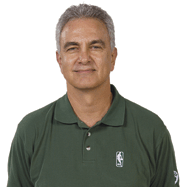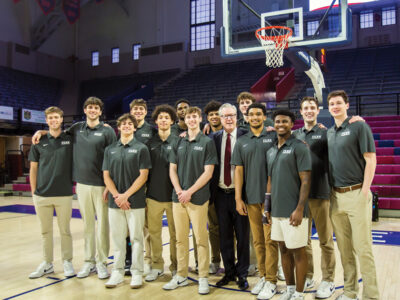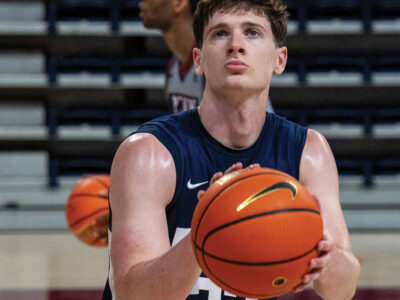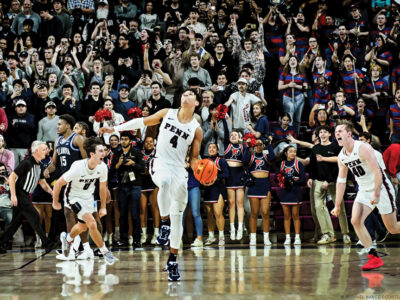
Class of ’71 | It has been more than 35 years since Dave Wohl C’71 sank his last basket in the Palestra for the Penn Quakers. But he has never left the game.
“I have a passion for basketball,” says Wohl. “I still love the sport. I love teaching.”

Since those heady days when he helped lead the Quakers to the NCAA Eastern Regional finals, Wohl has fashioned an impressive career in the National Basketball Association—first as a player, then as an assistant coach and head coach, with a stint as television analyst, scout, and executive vice president of basketball operations thrown in for good measure. Today he is an assistant coach for the Boston Celtics.
Wohl’s professional career began when he was picked in the third round of the NBA draft by the Philadelphia 76ers in 1971. He spent seven years in the NBA as a quick-thinking guard with the Sixers, Portland Trail Blazers, Buffalo Braves, Houston Rockets, and New York-New Jersey Nets, appearing in 410 games and scoring 2,553 points.
When his playing career ended, Wohl became an assistant coach for the Los Angeles Lakers, and worked in that capacity until the team won the NBA title in 1985. He then was named head coach of the New Jersey Nets, a position he held for three years, and in 1986 he led the Nets to the playoffs.
He believes his varied experiences have served him well.
“When you are a player and move to coaching, you have an understanding of what players go through,” says Wohl, who lists contract negotiations and trades as something that most people have trouble relating to. “Having gone through a lot of situations, you have a feel for what the player goes through.”
His three years as executive vice president of basketball operations—a sort of de facto GM—for the Miami Heat gave him a different perspective on coaches and players, he adds, noting that each of the roles he has had “builds upon the experience you had in another area.”
Wohl was an assistant coach with the Orlando Magic from 1999 to 2004 under Doc Rivers, and when Rivers took the head coaching job with Boston, he brought Wohl along as an assistant coach. Wohl says that his experience as a head coach enables him to be a “sounding board” for Rivers and give him a verbal pat on the back after he has coached a good game—something, perhaps, that the average fan may not realize has taken place, especially if a top player was playing with an injury.
“The weight really falls on the head coach,” Wohl adds. “The assistant really doesn’t have the consequences fall on his head.”
Wohl says he welcomed input from his assistant coaches when he was with the Nets. “I wanted guys to give me opinions,” he explains, “even if we yelled at one another.”
Although it has been 20 years since he was a head coach, Wohl says he would consider being one again. But, he notes: “Sometimes you only get one shot.”
Asked what the biggest difference is between today’s NBA and that of 1970s, Wohl responds: “First of all, players come into the league with more of a sense of entitlement from when I played or Doc Rivers played. Now, with the money invested, rookies are expected to contribute right away, whether they are ready or not.”
Yet that relationship with young players keeps Wohl fresh. More than an hour before a Celtics’ game, he can be found on the court with other Boston assistant coaches, working with players on fundamentals of the game. Despite his relatively short stature—he is listed as 6 feet 2 inches tall, a good five inches short of the NBA average—Wohl has the reputation of being a solid teacher of big men in the world’s top league.
He also knows what it is like to be the new kid on the block.
When Wohl was a sophomore (freshmen were not eligible to play for the varsity in those days), Penn played its first home game of the season at the Palestra. He vividly recalls what happened during pre-game drills: “I was so pumped up, I completely missed the lay-up by about 10 feet.”
“I never found an arena that had a better atmosphere” than the Palestra, Wohl adds. “We would see the same faces every year [sitting courtside]. There was an unbelievable Big 5 rivalry.”
Wohl racked up 823 points and 345 assists during his Penn years, and was a two-time All Ivy League player. He teamed up with Steve Bilsky W’71, now Penn’s athletic director, to give the Quakers one of the top backcourts in the country, and helped lead Penn to a mark of 68-13 in three seasons—not to mention two Ivy titles and two trips to the NCAA tournament. In 1971 Penn advanced to the Eastern Regional final of the NCAA tournament, and was ranked among the top teams in the country.
Wohl was named to the Big 5 Hall of Fame in 1975, and is a member of the Penn Hall of Fame—not bad for a kid who was recruited to Penn to play football.
Now, several decades later, Wohl still has a passion for the game.
“My goal is to keep from getting a real job,” he says with a laugh. “I have been able to do that so far for about 35 years.”
—David Driver




